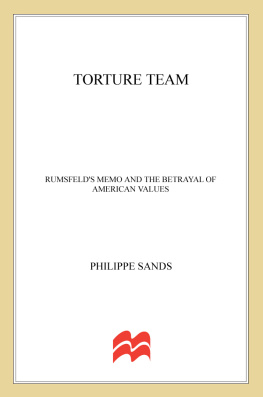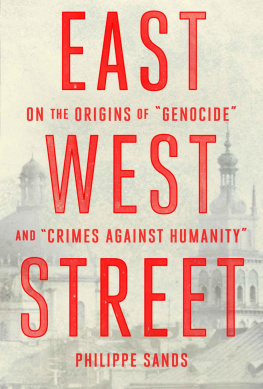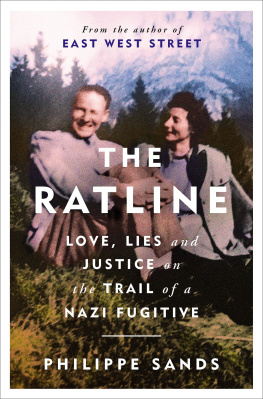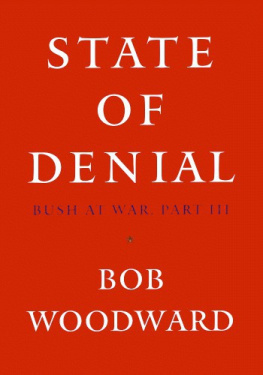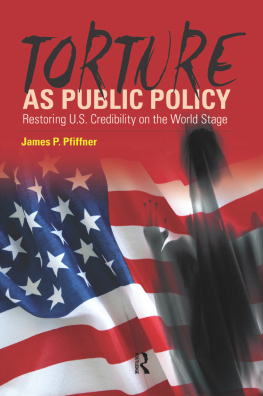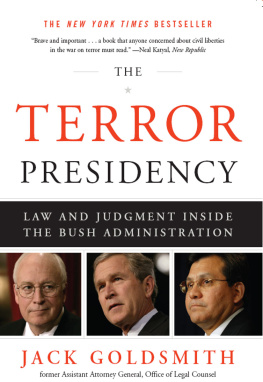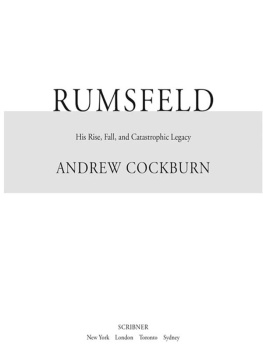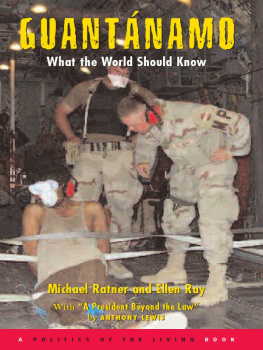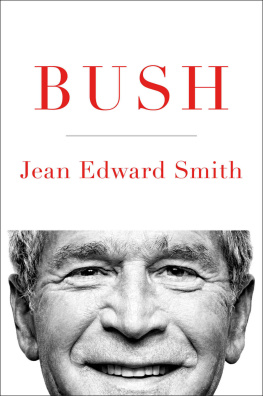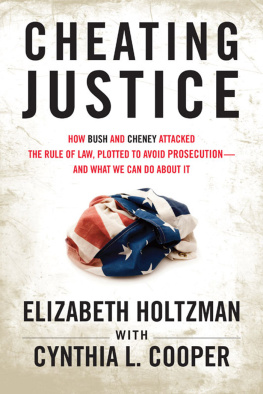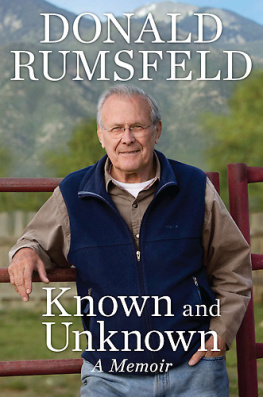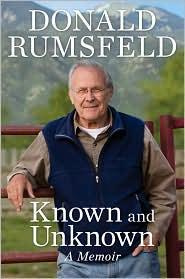TORTURE TEAM
TORTURE TEAM
Rumsfeld's Memo and
the Betrayal of American Values
PHILIPPE SANDS

The author and publisher have provided this e-book to you for your personal use only. You may not make this e-book publicly available in any way. Copyright infringement is against the law. If you believe the copy of this e-book you are reading infringes on the authors copyright, please notify the publisher at: us.macmillanusa.com/piracy.
TORTURE TEAM
Copyright Philippe Sands, 2008.
All rights reserved. No part of this book may be used or reproduced in any manner whatsoever without written permission except in the case of brief quotations embodied in critical articles or reviews.
For information, address St. Martins Press, 175 Fifth Avenue, New York, N.Y. 10010.
First published in 2008 by
PALGRAVE MACMILLAN
175 Fifth Avenue, New York, N.Y. 10010 and
Houndmills, Basingstoke, Hampshire, England RG21 6XS.
Companies and representatives throughout the world.
ISBN-13: 978-0-2306-1216-7
Our eBooks may be purchased in bulk for promotional, educational, or business use. Please contact the Macmillan Corporate and Premium Sales Department at 1-800-221-7945, ext. 5442, or by e-mail at .
Library of Congress Cataloging-in-Publication Data
Sands, Philippe, 1960
Torture team/Philippe Sands.
p. cm.
Includes bibliographical references.
1. Torture (International law)History. 2. Human rights. I. Title.
K5304.S26 2008
341.4'8dc22
2007041092
A catalogue record of the book is available from the British Library.
Design by Letra Libre
10 9 8 7 6 5 4 3 2 1
For my parents, Allan and Ruth
"We also have to work, though, sort of the dark side, if you will.... it's
going to be vital for us to use any means at our disposal, basically, to
achieve our objective."
Vice President Dick Cheney, Meet the Press,
September 16, 2001
"In situations like this you don't call in the tough guys; you call in the
lawyers."
former CIA director George Tenet,
At the Center of the Storm, 2007
ALSO BY PHILIPPE SANDS
Lawless World: Making and Breaking Global Rules
CONTENTS
ACKNOWLEDGMENTS
I begin by thanking all those who shared their experiences and views on the events described in this book. No one was under any obligation to do so, since I was not armed with any form of subpoena. Whatever reason each may have had, it is a mark of the openness of American society that people are willing to talk. The interviews took place between September 2006 and September 2007, mostly in the United States. Several interviews were recorded, but in others the interviewee preferred me to take detailed notes. In some cases I met the individual on only one occasion, in other cases I made repeated visits. I have also relied extensively on material that was in the public domain, even if sometimes obscurely so. On matters that appear to me to be significant I have, in general, tried to ensure at least two sources. In some instances off-the-record conversations provided important confirmation, but for reasons of professional etiquette I have made no reference to the contents of such conversations. I was constantly struck by the strong sense of public service and professionalism in so many of the people I met. It may be unfair to mention any group in particular, but I cannot avoid expressing appreciation for the career military lawyers I talked to around the United States, women and men of integrity and professionalism whose attitudes reflect the best American traditions of valor. For everyone, I hope to have reflected the contents of the conversations and interviews in a way that is fair and balanced. If I have failed to do so, the responsibility is mine alone.
Several friends and colleagues generously agreed to review draft chapters or passages and make suggestions. I am especially grateful to Jane Mayer, whose brilliant and brave articles in the New Yorker are a source of great inspiration, and whose assistance and collegiality was constant. I hope one day to be able to do the same in return. For insights and critique I am grateful to James Cameron, Adriana Fabra, Nick Hornby, Scott Horton, David Kennedy, Robert McCrum, Tim Owen, David Rakoff, Susan Talalay, and Don van Natta. My brother Marc gave unstinting support, as he always does.
A number of individuals, some occupying senior positions, provided invaluable assistance and have asked to remain in the background. Anonymity cannot obscure the depth of my appreciation, not least for their principled stand on matters of real human importance.
Others have assisted in a range of different ways. My sincere thanks to Daniel Alexander, Moazzam Begg, Sidney Blumenthal, John Bush, Professor Andew Clapham, Professor David Cole, Ernesto Ekaizer, Bart Gellman, Gay Gill, Tim Golden, Katherine Gorove, Karen Greenberg, Ann Hennigan, General Sir Mike Jackson, Jonathan Klein, Professor Dawn Johnsen, Professor Marty Lederman, Leanne Macmillan and Sheila Melzak at the Medical Foundation for the Care of Victims of Torture, Professor Kate Malleson, Henry Mayer and Dr. Juergen Matthaeus at the Holocaust Museum in Washington, Donna Mcmurray, Jonathan Marks, Brenda Moski, Dr. Christopher Mueller and Dr. Peter Spaengler of Altsttter & Spngler, Ed Pilkington, Paul Reichler, Simon Rooke (for providing a copy of The Memory of Justice, Marcel Ophls' classic film), Professor Beate Rudolf, Michael Scherer, Andr Schiffrin, Leina Schiffrin, Gnter Schulze-Weckert, Dr. Constanze Stelzenmller, Professor Richard Stewart, Brenda Tuttle, Erin Voto, Diane Wachtell, Colonel Kelly Wheaton, Laurence Wilkerson, and Ed Williamson.
I have benefited greatly from first-class research assistance. Chanda Betourney at Georgetown Law School guided me around U.S. Congressional documents, and Mirja Trilsch from Dsseldorf and the Universit du Qubec Montral provided invaluable assistance on German historical materials. I am also grateful to Joel Gregorio, Hejaaz Hizbullah and Mustafa Qadri from University College London and Keith Chapman at NYU Law School. Julie Albrektsen at Matrix Chambers organized the voluminous materials and assisted on the footnotes, both important tasks carried out with great skill.
At UCL, Professor Ian Dennis generously allowed me a year's sabbatical to complete this book, and Cathy Brown provided consequential support; thanks to Ruth Mackenzie for taking on additional teaching commitments and being a terrific colleague, and to all at the law faculty for their encouragement and support. Thanks also to friends at Matrix Chambers, in particular Kate Cook, James Crawford, Zachary Douglas, Alison Macdonald and Blinne Ni Ghralaigh for holding the fort, and to my practice managers for living with the consequences of putting my practice on hold for a few months.
I have had the great fortune to be assisted by two wonderful administrative assistants. Jenny Bromley transcribed some of the taped interviews and, as reflected occasionally in the text, I benefited from her perceptive insights on their contents. Kate Barber has once again demonstrated why she is indispensable, and probably the only person in the world who can decipher my writing in reasonable time and maintain good humor.
In London my agent Gill Coleridge provided all the support one could conceivably ask for, and far more. Her knowledge of, and interest in, the issues and her constant enthusiasm and ideas provided great support. In New York, Melanie Jackson performed an equally admirable role, having to go to bat on a sticky wicket (saturated market) and she delivered up trumps. It is difficult to imagine a more committed team than Gill and Melanie, or one that could be better placed to contribute in this subject area.
Next page
